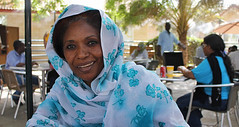
Intisar Ahmed al-Agli's motto is that 'women are the symbol for change.' The national elections were held in Sudan between April 11-15, 2010. [Fatma Naib]
Originally uploaded by Pan-African News Wire File Photos
By James Copnall
BBC News, Khartoum
On Saturday two major groups will give their initial responses to Sudan's controversial elections.
The EU and the Carter Centre, the organisation of the former US President Jimmy Carter, had two of the biggest observer missions on the ground.
The polls were intended to effect a democratic transformation in Africa's largest country.
The complicated elections have already been heavily criticised by the Sudanese opposition and local observers.
Many parties and politicians opposed to President Omar al-Bashir boycotted the polls before they started to protest at alleged fraud.
Then the vote had to be extended by two days after the delayed arrival of electoral material meant many polling stations opened late.
Conciliatory remarks
Mr Carter has so far been conciliatory in his public remarks, suggesting the National Elections Commission was doing its best to produce fair polls.
That angered many opposition politicians and democracy activists, who believe the Elections Commission is biased in favour of President Bashir's party.
The EU observation report will also be watched closely. The EU's team was withdrawn from Darfur, where a low-level civil war continues, because of fears about safety and whether the monitors could observe freely.
These initial reports will give some indication of whether the rest of the world considers these landmark elections to have been free and fair.
President Bashir is hoping for a respectable win, in particular after he was indicted by the International Criminal Court for alleged war crimes in Darfur.
During the campaign he railed against interference by foreign observers, before softening his tone somewhat.
Story from BBC NEWS:
http://news.bbc.co.uk/go/pr/fr/-/2/hi/africa/8626677.stm
Published: 2010/04/17 01:09:57 GMT
No comments:
Post a Comment